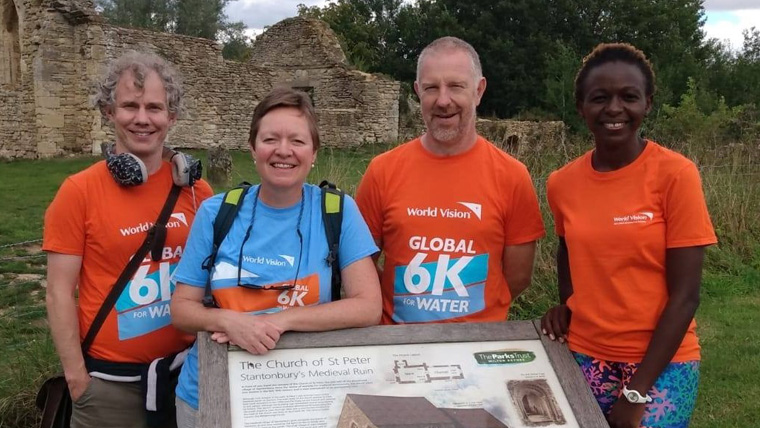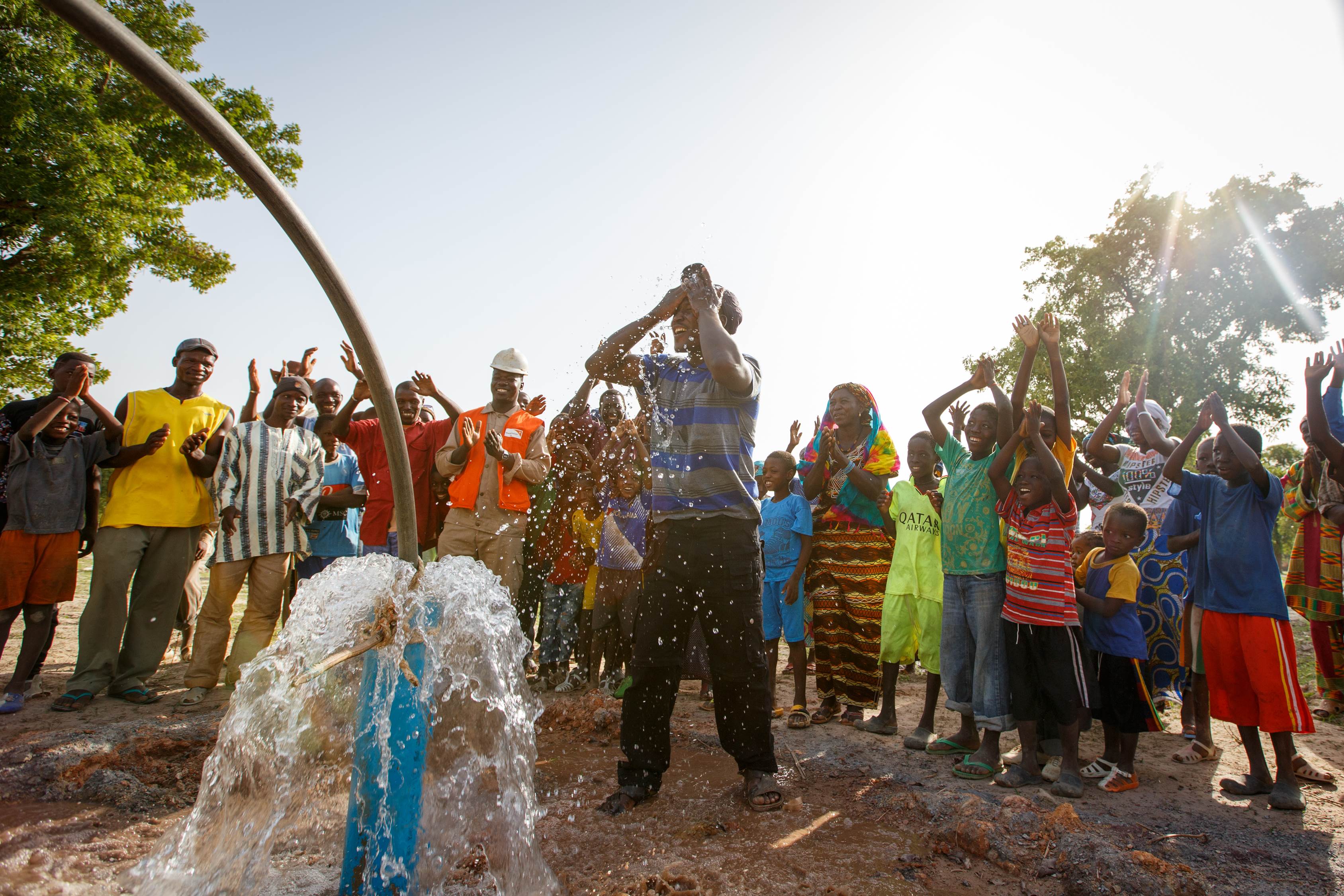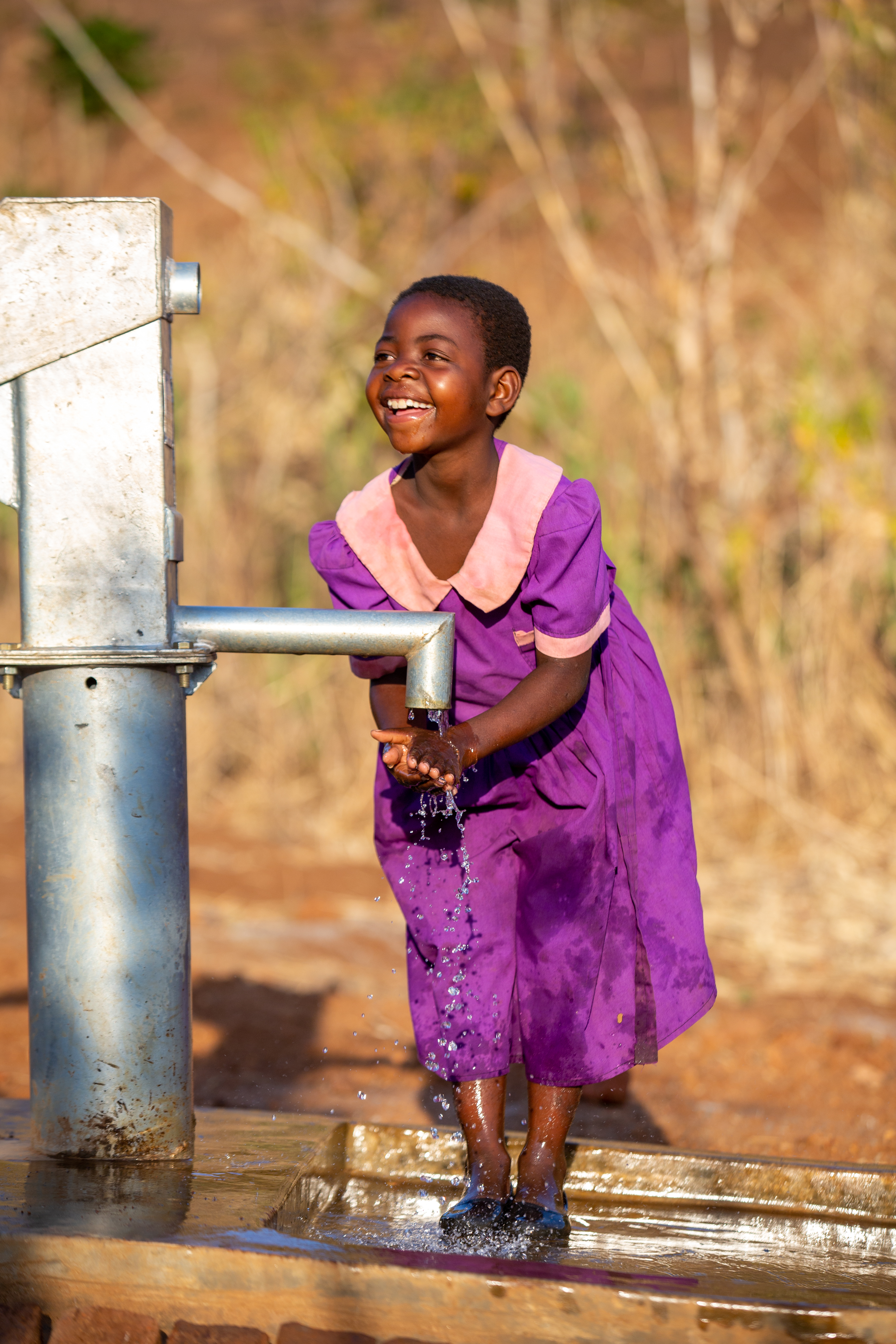
Thirsty for change: Global 6K
Make a life-changing difference to children like Ireen this August
Clean water saves lives
In 2020, the importance of clean water and handwashing is more obvious than ever.
In August, we’ve got the chance to make a life-changing difference to children like Ireen, whose family lives miles away from a clean water source. Read her story below.
Ireen's story
The most beautiful of constellations, Orion, hangs low over the village in central Malawi. The stars around it are as uncountable as the grains of sand bordering Lake Malawi, 60 miles away. Far below Orion’s shimmer, a rooster crows — an alarm clock with feathers, strutting through the darkness past a row of huts where adults and children yearn for a few more hours of rest. Eight-year-old Ireen is fast asleep in her grandmother’s one-room hut. Next door in her mother’s house, her sister, Jekina (four), stirs as the rooster continues the hullabaloo, no snooze button to silence him.
The girls’ mother, Happiness — Chimwemwe in her native tongue of Chichewa — wakes in the dark to make her first walk of the day to collect water under the night sky. She ties her one-month-old baby, Secret, securely to her back with a colourful piece of cloth, then walks with her twin sister, Gift, in single file from their huts to a stream whereas many as a thousand people will collect water and wash clothes from morning until night. Although it is dark, the 26-year-olds don’t need a torch. They know this path. They have been walking its treacherous terrain since they were four.
The stream where the family collects water is within the Great Rift, with rocky hills and slippery valleys. Falling down a hill means certain injury, while the valleys make for a gruelling return climb — especially carrying a heavy bucket of water on your head in sweltering temperatures.
The stars above the path are dizzyingly spectacular, but their magnificence is lost on Happiness. The single mother worries about her house — at only 12 feet across, it’s too small for all four of her children. She worries about leaving Jekina alone every morning — what if someone tries to abduct her? She worries about feeding her son, Beauty, who is staying with his father, her ex-husband tonight — the growing 11-year-old is always hungry, and there’s only one bag of maize left. She worries about Secret, adorable but fussy. And she worries about Ireen, the daughter who reminds her so much of herself — smart and feisty. How can Ireen reach for the stars in a place where food and water are unreachable?
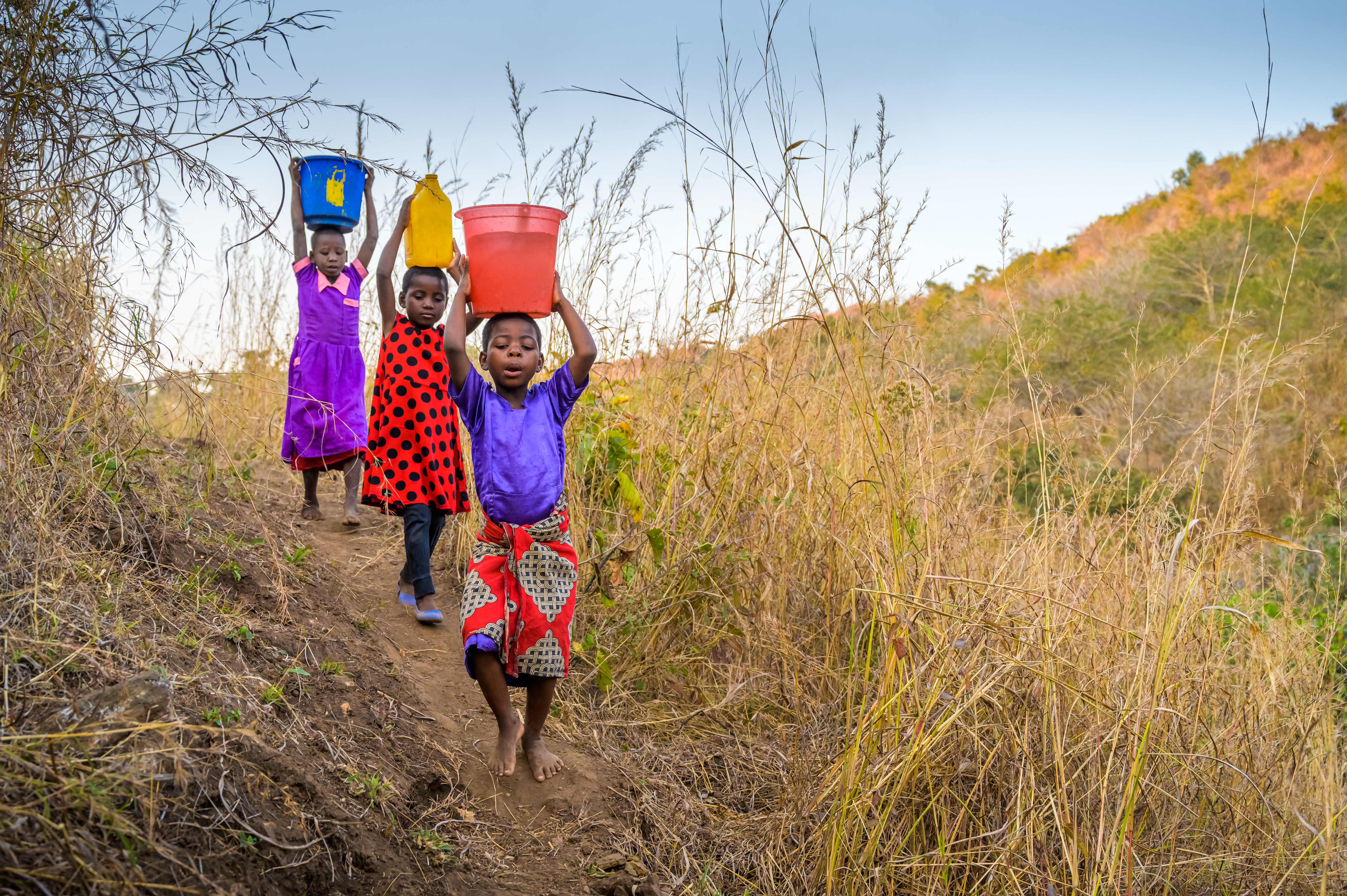
Rifts in children's lives
When Happiness returns with the day’s first supply of water, she is relieved to find four-year-old Jekina still safely asleep in their small, round mud house. And then, as the sun rises with a resolve that foretells of another hot day, Ireen emerge from her grandmother’s neighbouring hut. “I wake up happy,” she says, her joy taking the form of a brilliant smile. Ireen’s energy pulsates.
Now it's light, it's Ireen's turn to go for water.
Last year, Ireen asked her mother if she could start gathering water. She saw the weight her mother was carrying, pregnant with her fourth child, struggling to feed and clothe her children. Gathering water was a burden Ireen could share. “I told her she was too young,” says Happiness. “Ireen insisted.” Although it’s a task she volunteered for, it’s not one Ireen enjoys. “It makes my neck hurt,” she says.
Barefoot, Ireen can balance 20 pounds (9 kilograms) of water on her head, trying with all her might not to trip and fall. Injury is just one fear. Another is breaking the red plastic bucket. As her mother has warned her on many occasions, there’s no money for another. For me, it would be like wrecking the family car.
Ireen will walk for water up to three times today, unless she helps with laundry. Then, she will go four times. Throughout the course of their daily water-collecting journeys, Ireen and her mother will walk about 6 kilometres (or 3.7 miles): the average distance women and children in the developing world walk every day for water.
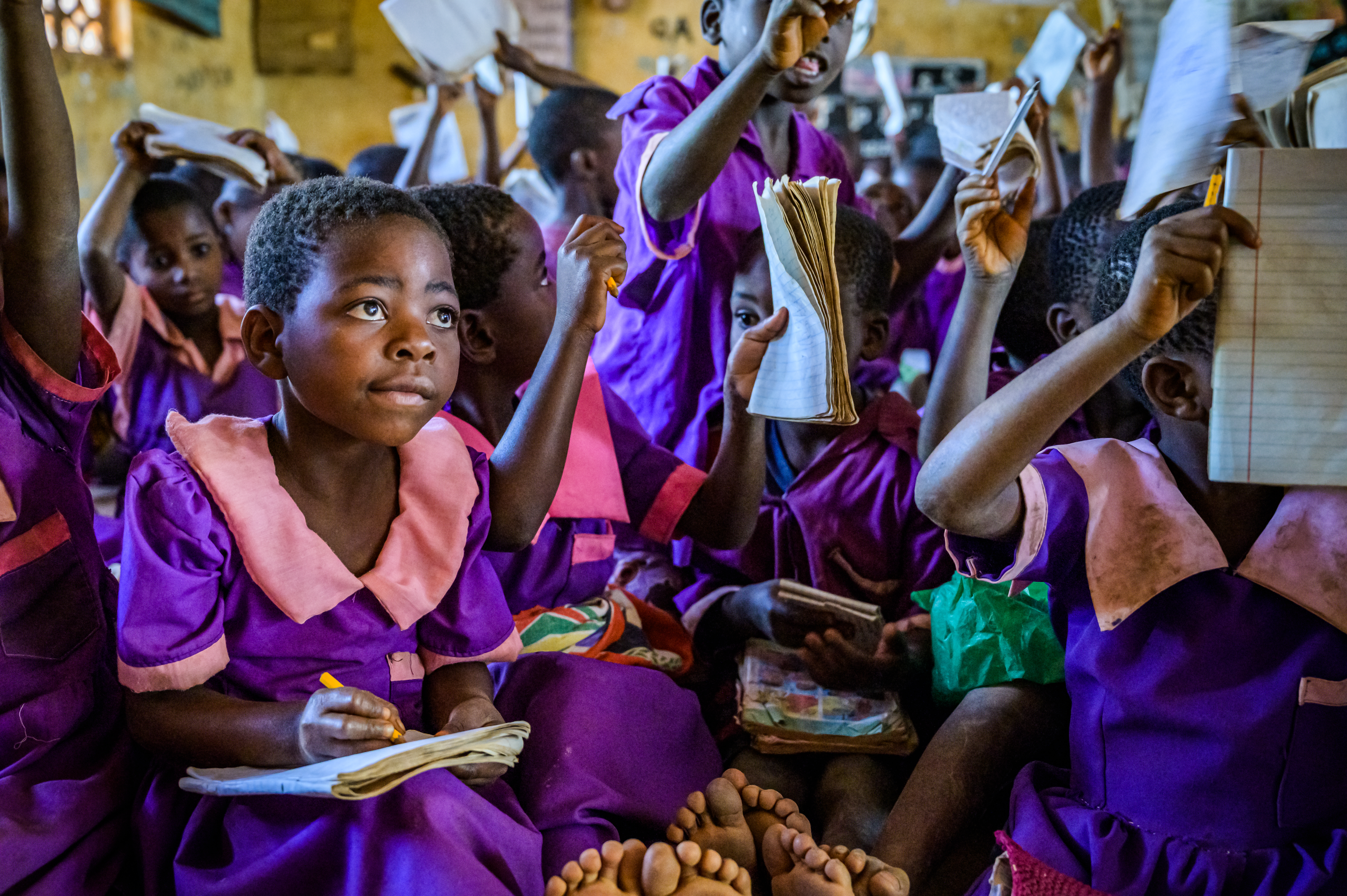
Time for an education
It’s best for Ireen to go before it gets too hot — plus, school starts at 7:30am. She can’t be late. “She’s my favourite,” says Ireen’s teacher, 30-year-old Timale Chisutu. “She is quick to respond. She is not shy when she knows the answer.” Ireen ranks ninth in a class of 157 students, a remarkable feat given her circumstances. “I know how she lives,” says Ireen’s teacher. “She comes from a very poor family. I can tell by her clothes, her uniform, books, pencils, and her body. Sometimes she is very dirty.”
Although she comes to school without having washed, there are times that diarrhoea, a result of drinking unsafe water, keeps her away. Diarrhoea is a serious health issue for the community, says Fenless Chimutu, 34, the nurse and midwife in charge of the local health clinic where Happiness gave birth to Secret.
The nurse, who’s been at the clinic for five “tough and difficult” years, sees hundreds of patients every day. “If there was clean water, that number would be reduced to less than half."
A small taste of the future?
Ireen’s community has never had a borehole well. But, a neighbouring community’s borehole is near her school and – while her community isn’t allowed to draw from it – the children can use it while they’re in class. Ireen prefers the borehole water to what she gets from the stream near her house — she knows the borehole water is clean and the water from the stream is not.
“It makes me afraid,” she says. “I’m afraid of the water because I know that worms are going into my body.” Usually bright, Ireen’s countenance darkens. At school, her teacher notices Ireen’s tension and says, “Sometimes she looks anxious.”
Playing helps ease that anxiety, if only temporarily. Ireen and her friends play games like Mira, a game that takes dodgeball to new heights. They attempt to build a tower of rocks while avoiding being hit by a ball made of rags. And there’s Champi — a long jump game played with three sticks that are moved apart to make it harder to jump over them. The only problem with playing games: Ireen gets thirsty.
In fact, she says, she is thirsty all the time.
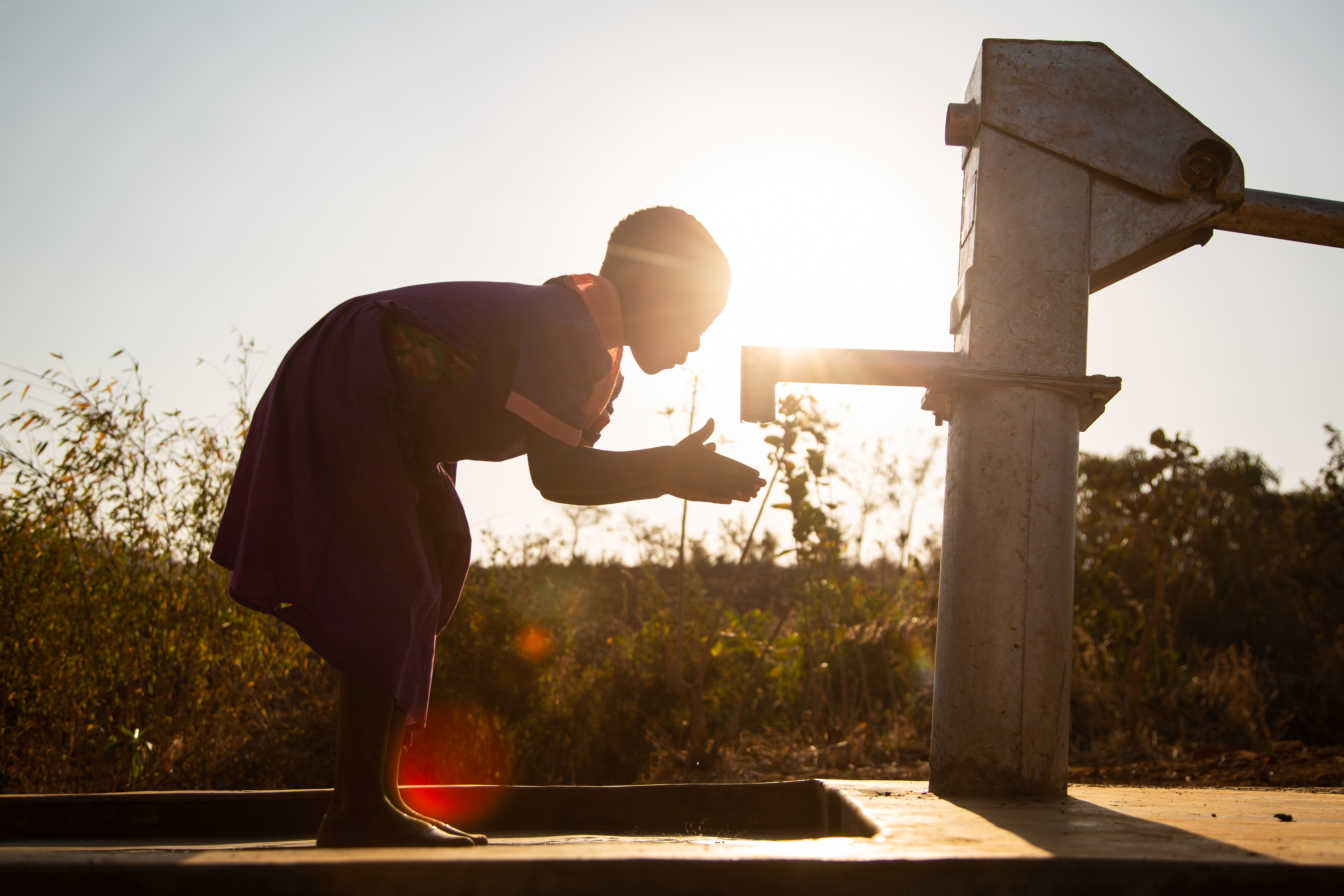
Rifts in the family
Ireen’s childhood is similar to her mother’s.
“We did not enjoy our childhood,” says Happiness. “We would wake up in the morning, go get water, and go to school. Then we would go straight to get water. We didn’t have time to play. It was tough for us as children. We were always tired.” When they were about Ireen’s age, their uniforms finally became too ragged to repair, and they dropped out.
The two girls began working in other people’s fields all day, getting paid in maize — about 10 pounds for four days’ work. Their daily grind was interrupted by a visit from Samuel, the man who would become Ireen’s father.
Samuel’s proposal was no scene from a romance novel. “He said, ‘Is there a woman I could marry in your family?’” recalls Happiness, who was 15 at the time. “They (her mother and Samuel’s family) made arrangements, and then we got married.”
Happiness hoped that Samuel would take care of her, but instead he became jealous. “When I went to get water, he would think I was out meeting other men,” she says. “He would be mad and beat me up.” Just as water played a role in Happiness’ dropping out of school, now it was threatening her marriage. “It was really an issue, not just for our marriage but for everything,” she says. “Women have to spend so much time getting water that we can’t focus on other things, like our families.”
Rifts in the community
In Malawi and around the world, the lack of sufficient water leads to fights at water sources, according to a U.S. Agency for International Development brief.
The thought of Ireen becoming involved in a physical altercation frightens Happiness. “I fear that she will have to fight her way for the water,” she says. It’s not an idle fear; she’s seen it happen to others.
“Sometimes you’ve waited, and people just cut in line,” she says. That’s when the punching begins. In a neighbouring community where water is similarly limited, the chief instituted a one-bucket rule. “Filling too many buckets delays everything,” says M’mangepo Baifoti, 47, who goes to church with Happiness. But one day, a woman brought three buckets to fill. She wanted to wash clothes so her family was fresh and clean for church.
“It was bad,” says Phillipo Mankhanibo, 41, the chief of that village. “There was fighting and there was blood. They broke each other’s buckets. They had to go to the hospital.”
The chief settles a lot of disputes over water. “The area is so big that there’s a lot of water-related conflict — most of it, in fact.” And if there were clean water? He sighs. “My life would be much easier.”
Mending the rifts
The rifts around Ireen may seem insurmountable, but a group of strong women among World Vision’s local staff are committed to repairing them. Mereena Mhone John, 41, manages child sponsorship in Ireen’s community with empathy and a vision for lasting change. She’s well-prepared for the work, holding degrees in arts and humanities, and development, and a Master’s in leadership and change from universities in Malawi, South Africa and the United Kingdom.
Mereena has witnessed the changes child sponsorship brings.
One of the most immediate impacts sponsorship can have on kids’ health and overall well-being is funding borehole wells and water systems. Once a community has easy access to clean, safe water, they no longer suffer from water-related diseases like diarrhoea and cholera — and women and girls are no longer trapped in the cycle of walking for water.
Hope in the valley
It’s evening in the village. Gift’s sons are crab-walking in the dirt. Jekina is dancing to music of her own making, and Ireen is playing with her friends. Beauty is at his father’s house; otherwise he’d join in the fun.
The idea of a borehole in the community is exhilarating. “It would bring so much change in my life and the community,” says Happiness. “It would mean the end of walking for water. We would be able to rest. We would be able to work in the garden. My children could play and do their schoolwork.”
A gentle breeze blows through the palm trees and the clouds become the colour of roses as the sun fades. Orion will soon appear. The rooster struts by, preparing for tomorrow. He needs to be ready. Morning comes early in the Great Rift Valley.
Your chance to change lives
This year, it’s especially important to make sure children, like Ireen, can access clean water as, around the world, handwashing has become the first defence against coronavirus.
And, of course, it’s vital that you stay safe too. So, this August, the Global 6K has gone virtual. No big events – but lots of opportunities to raise money, have fun and do the 6K your way.
Walk, run, scoot or wheel. Go outside or challenge yourself at home. Have fun with the family or hit a personal target. And raise money for vital water projects that will change the lives of families like Ireen’s.


